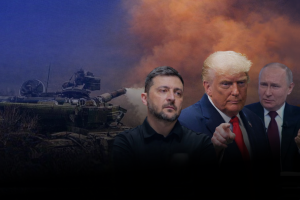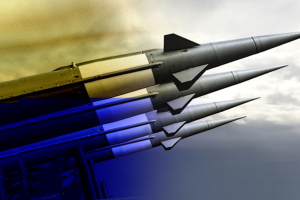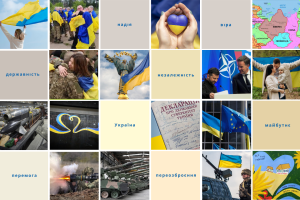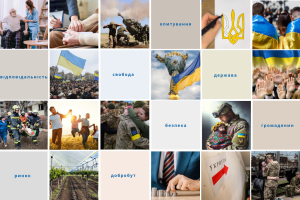The Threat of a Further Invasion: Public Opinion on the Conflict, Potential Compromises, and Resistance to Russia
National survey was conducted by Ilko Kucheriv Democratic Initiatives Foundation together with the sociological service Razumkov Center on December 17-22, 2021 in all regions of Ukraine, except for the occupied territories of Crimea and certain areas of Donetsk and Lugansk regions. 2018 respondents over the age of 18 were interviewed. The theoretical sampling error is 2.3%.
The survey was conducted at the organization's own expense. The first two questions (concerning who started the conflict in Donbass, as well as the interpretation of the conflict) are part of the joint study that was conducted on demand of Detector Media NGO.
- The majority of Ukrainians (65%) remain convinced that it was Russia that started the war in Donbas. The majority of voters of "European Solidarity" (92%), "Servants of the People" (78%), "Batkivshchyna" (69%) and the party " Strength and Honor" (74%) hold such an opinion. Only among the voters of Opposition Platform for Life (46%) and Nashi (60%), the majority believe that the first who started the war was the Ukrainian government and the oligarchs.
- In all macro-regions of Ukraine the responsibility for starting the war is mainly attributed to Russia, although there are differences in the pervasiveness of this opinion. This perception of events is most common in the West (89%) and in the Center (74%) of Ukraine. The relative majority also agree with this in the South (44%) and in the East (39%) of Ukraine. However, in these regions the proportion of those who believe that the Ukrainian government and the oligarchs are the initiators of the war is higher than in the West and the Center regions (23% in the South and 33% in the Eastern region). Also in the South and in the East of Ukraine there are more of those who have not decided on their opinion on this subject (33% and 28%, respectively).
- 68% of Ukrainians consider the conflict in Donbas as Russian aggression with the use of local proxies. Moreover, there is a 14.5% increase in the number of supporters of this point of view in comparison with May 2021 (in the study conducted in May 2021 this point of view was supported by 53.5% of respondents).
- The majority of supporters of "European Solidarity", "Servants of the People", "Batkivshchyna", and "Strength and Honor" parties consider the conflict in Donbas to be Russian aggression. In contrast, the electors of OPfL and "Nashi" parties predominantly consider it a domestic Ukrainian conflict. However, overall in Ukraine only 15% of citizens consider this conflict to be a domestic Ukrainian conflict.
- The conflict in Donbas is mostly perceived as Russian aggression in all macro-regions of Ukraine: this opinion is shared by 91% of residents of the West of Ukraine, 77% residents in the Center of Ukraine, 53% residents in the South and 42% residents in the East of Ukraine. The idea that the conflict in Donbas is a domestic Ukrainian conflict is more often met in the East of Ukraine (33%), but even there there are more of those who perceive it as Russian aggression (42%).
- As Ukrainians believe, it is possible to achieve long-term peace in the Donbas by increasing diplomatic pressure and sanctions against Russia (20%) and strengthening the economic and military potential of Ukraine (19%). These views on the "path to peace" have been fairly stable since the beginning of the conflict.
- With the escalation and threat of a new invasion, none of Ukraine's concessions in favor of Russia began to be perceived as a guarantee of long-term peace in the Donbass. Thus, near only 14% of Ukrainians support "direct negotiations" with the occupation administrations and their recognition as the legitimate authority in the occupied territories. Only 8% believe that Ukraine’s refusal to become a NATO member may be an effective way to achieve peace. Only 4% consider it reasonable to agree with the autonomy of Donbas and to recognize the loss of Crimea, and only 2% consider agreeing with the annexation of Crimea "in exchange" for peace in Donbas.
- 48% of Ukrainians believe that supplying Ukraine with weapons and conducting joint military exercises with the U.S., EU and NATO countries will deter Russian aggression. 33% believe that it would rather provoke Russia.
- The majority of residents of the West and the Center of Ukraine (69% and 51%, respectively) consider the supply of weapons to Ukraine as a way to deter Russia. However, in the South and East of Ukraine the relative majority (47.5% and 49% respectively) tend to believe that the supply of weapons and conducting joint military exercises with NATO countries will rather provoke Russia to aggression. About one-third of residents of the South and East of the country adhere to the opinion that these measures will nevertheless serve as a deterrent to the aggressive intentions of the Russian Federation.
- Since the beginning of the conflict in the Donbass, there has been a prevailing opinion among Ukrainians that for the sake of peace in the Donbass it is acceptable to make compromises, but not all of them. Today 50% of respondents hold this opinion (in May of last year about 46% believed so). This opinion dominates among supporters of the key political parties: "Servant of People" (53%), "Batkivshchyna" (53%), "Strength and Honor" (57%), "European Solidarity" (45.5%), OPfL (51%) and "Nashi" (51%).
- Those who are ready to make peace at any price are an absolute minority (15%). In contrast, 20% are convinced that peace can be achieved only by force, when one of the sides wins.
- In the regional context, the support for limited and not any compromises is also prevailing. Residents of the East of Ukraine more often than residents of other regions are ready to make any compromises (27%). However, even here a relative majority (46%) agree to only limited compromises. The West of Ukraine is remarkable for the fact that in this region, more than in other regions (30.5%), the opinion that peace is possible only in case of a military victory of one of the parties is widespread.
- The majority of Ukrainians (54%) believe that the most desirable option for the political future of the currently occupied territories of Donbas would be their return to Ukrainian control under the same conditions as before the conflict began. There is less support for formal autonomy (13%) or returning to Ukrainian control with the expansion of the local self-government for these territories (10%). Independence of pseudo-republics or their incorporation into the Russian Federation are almost marginal opinions (3% each).
- The idea of returning the temporarily occupied territories of Donbas under the same conditions as before prevails in all regions of Ukraine, but the level of support varies. In the West of Ukraine this option is supported by 67% of citizens, in the Center - 61%, in the South - 54.5%, in the East - 33% (but here this option is also the most widespread).
- In the case of a further Russian invasion, 43% of Ukrainians are ready to engage in one form or another to repulse the aggression. 10.5% are ready to join the Armed Forces of Ukraine at the war front, 9% would join the volunteer military forces, and another 23% expressed their willingness to provide all possible non-military assistance (with money, work, as a blood donor, etc.). At the same time, 18.5% said they would simply try to survive and would not do anything special. 4% would try to leave the country. Another 22.5% do not believe in any way that a new invasion will ever take place.








